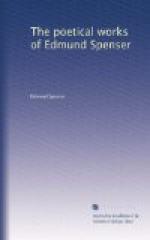For since the time that Phoebus foolish sonne,
Ythundered, through loves avengefull wrath,
For traversing the charret of the Sunne
Beyond the compasse of his pointed path,
10
Of you, his mournfull sisters, was lamented,
Such mournfull tunes were never since invented.
Nor since that faire Calliope did lose
Her loved twinnes, the dearlings of her ioy,
Her Palici, whom her unkindly foes,
15
The Fatall Sisters, did for spight destroy,
Whom all the Muses did bewaile long space,
Was ever heard such wayling in this place.
For all their groves, which with the heavenly noyses
Of their sweete instruments were wont to sound,
20
And th’hollow hills, from which their silver
voyces
Were wont redoubled echoes to rebound,
Did now rebound with nought but rufull cries,
And yelling shrieks throwne up into the skies.
The trembling streames which wont in chanels cleare
25
To romble gently downe with murmur soft,
And were by them right tunefull taught to beare
A bases part amongst their consorts oft;
Now forst to overflowe with brackish teares,
With troublous noyse did dull their daintie eares.
30
The ioyous Nymphes and lightfoote Faeries
Which thether came to heare their musick sweet,
And to the measure of their melodies
Did learne to move their nimble-shifting feete,
Now hearing them so heavily lament,
35
Like heavily lamenting from them went.
And all that els was wont to worke delight
Through the divine infusion of their skill,
And all that els seemd faire and fresh in sight,
So made by nature for to serve their will,
40
Was turned now to dismall heavinesse,
Was turned now to dreadfull uglinesse.
Ay me! what thing on earth, that all thing breeds,
Might be the cause of so impatient plight?
What furie, or what feend, with felon deeds
45
Hath stirred up so mischievous despight?
Can griefe then enter into heavenly harts,
And pierce immortall breasts with mortall smarts?
Vouchsafe ye then, whom onely it concernes,
To me those secret causes to display;
50
For none but you, or who of you it learnes,
Can rightfully aread so dolefull lay.
Begin, thou eldest sister of the crew,
And let the rest in order thee ensew.
CLIO.
Heare, thou great Father of the Gods on hie,
55
That most art dreaded for thy thunder darts;
And thou, our Syre? that raignst in Castalie
And Mount Parnasse, the god of goodly arts:
Heare, and behold the miserable state
Of us thy daughters, dolefull desolate.
60
Behold the fowle reproach and open shame
The which is day by day unto us wrought
By such as hate the honour of our name,
The foes of learning and each gentle thought;
They, not contented us themselves to scorne,
65
Doo seeke to make us of the world forlorne*.
[* Forlorne, abandoned]




